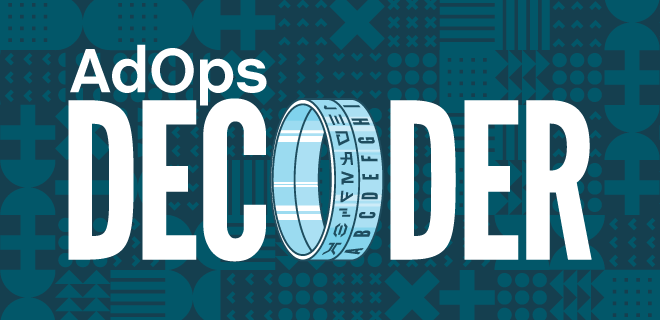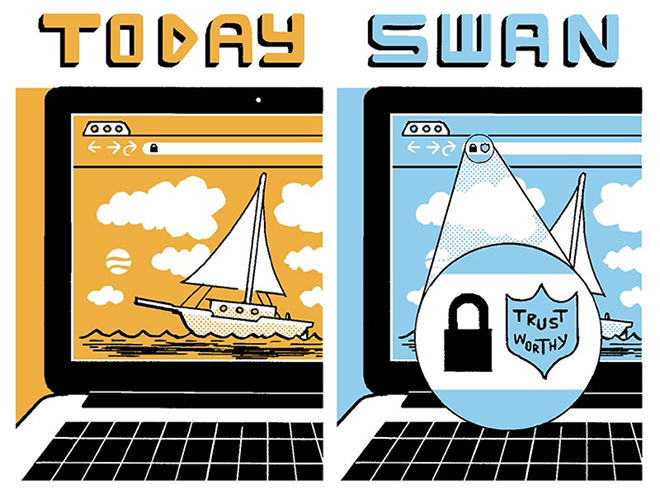
Advertisers will spend their money on the solutions that generate the highest perceived return on investment (ROI). If Google and others can provide the highest ROI because they offer personalized marketing solutions, then why not their rivals?
Who is Google and Apple to remove features from the web that enable their rivals to compete? No one voted for Google or Apple.
What Is SWAN?
You may have heard of SWAN in Google’s Privacy Sandbox, but this SWAN is a community-operated and open source replacement for many use cases supported by third-party cookies. Compared to Google’s Privacy Sandbox offerings, SWAN (Secure Web Addressability Network) provides a legally compliant solution that will improve people’s privacy. No directly identifiable personal information is transmitted, and people only receive personalized marketing if they want it.
Created by legal, economic, and engineering experts, SWAN is underpinned by robust standard contractual terms (like those used to share personal data between the US and Europe or in open-source projects). SWAN uses pseudo-anonymous identifiers to enable the millions of online businesses and organizations to not only comply with European privacy laws but also Mozilla’s widely praised data privacy principles.
SWAN provides choice. SWAN recognizes the interrelationship between publishers, marketers, and people. Publishers and marketers gain improved revenue and ROI, as SWAN’s transparency reduces waste and helps detect fraud.
People know that their privacy rights and choices are respected by those parties that receive their data and the same transparency enables them and their governments to hold each organization accountable.
SWAN.community is built upon these six core principles:
- user experience
- trust
- privacy
- preserving the Open Web
- community
- stability
These principles are fundamental to provide features that support people’s ad-funded access to the open web while improving their privacy.
Privacy by design. People consent to share their data only with parties that have agreed to a set of standard contractual clauses known as the Model Terms.
Given most people have no understanding of all the B2B partners any publisher or marketer works with, SWAN focuses on providing people choices that they can understand. SWAN uses plain language to ask if people are comfortable with personalized marketing when accessing ad-funded websites. Their choice is persisted across all SWAN participating websites if they wish. All the SWAN data is automatically deleted every 90 days, or on request by simply closing a private browsing window or manually resetting.
SWAN’s design enables people to have elevated preferences for particular sites, without overriding their default settings for others. People’s choices reduce consent fatigue and speed up their navigation across the web.
Exclusively pseudonymous identifiers, even for cross-device synchronization. SWAN never shares people’s directly identifiable personal information like name, email address, or mobile number with publishers or marketers. People are still free to have direct relationships with publishers and marketers if they wish.
Email address is always optional and because it’s never provided by SWAN to publishers or marketers there are zero risks of receiving spam. Cross-device pseudo-anonymous identifiers are created when email is provided. These can easily be reset.
Clarity. SWAN places people in control and is a country mile ahead of other solutions because it’s run as a community that only uses data for purposes people can understand. SWAN uses inspectable audit logs so that people or their agents know their preferences are respected. To guarantee the ecosystem that they comply with the rules, SWAN operators are subject to very high standards of external audit.
How Does SWAN Work?
SWAN uses the most stable components of the web that have been around for 20 years. It’s so simple, it even works without JavaScript.
Cookies are merely small files that allow web browsers to store data. SWAN uses cookies to store people’s consistent preferences, but they are only read and updated in a first-party setting. The interoperable data SWAN maintains is sent only to participating organizations, who agree to the Model Terms that restrict how the data can be used. SWAN participants must also update their privacy policy such that their promises are enforceable by government authorities too.
SWAN ensures publishers and marketers continue to choose who they want to work with. The operation of SWAN is designed to be decentralized and foster greater competition. SWAN just works and provides the web with greater utility. Identifiers and preferences really should be straightforward rather than something people must re-think every time they visit a site.
What Are Others Saying About SWAN?
Many within the industry recognize the benefits of bringing stability and certainty to the foundations of the web’s economic model. Regulators like the UK’s Competition and Markets Authority (CMA) and Information Commissioner’s Office (ICO) are open to the principles of SWAN.
Browser vendors are wedded to a privacy model for the web that is based on corporate ownership of registerable domain names that bear no relationship with modern privacy laws. This is unfortunate but doesn’t really impact the implementation of SWAN. If browser vendors were to attempt to interfere with SWAN, then they would annoy their users who will either disable the browser vendor’s interference option or switch to a different browser. That’s fine with SWAN. People should have choices.
Browser vendors can support SWAN by providing the web community with a new type of shared storage that is accessible to all parties via a common legal contract. SWAN.community is advocating for such an upgrade to the architecture of the web in forums like the W3C.
SWAN VS Other Third-Party Solutions
As SWAN is just one of a few other third-party cookie alternatives, we’ve created a comparison table to give you a complete overview of the key features of each solution.
If you have any questions about SWAN, [email protected].
To learn more, watch this 20-minute talk by James Rosewell, CEO of 51Degrees, at IAB France’s webinar Cookieless & Consentless:


